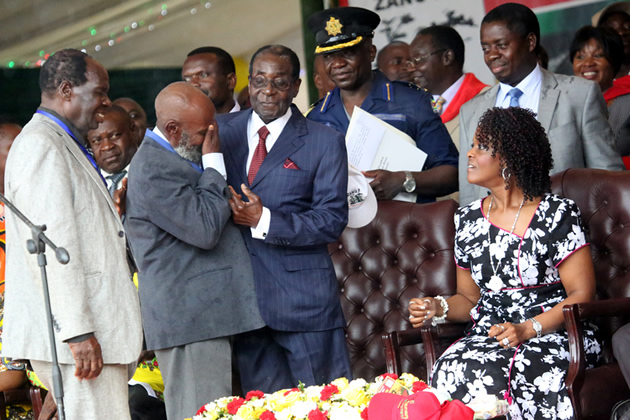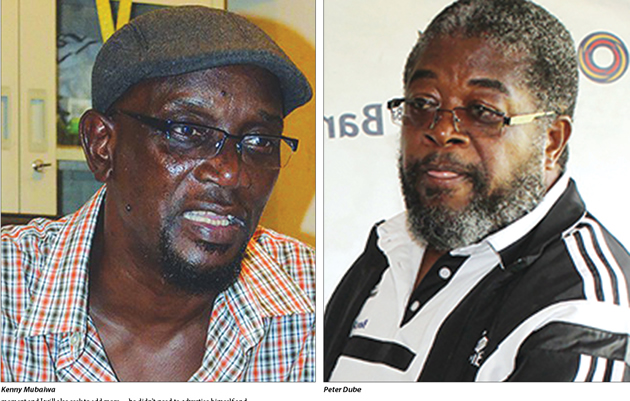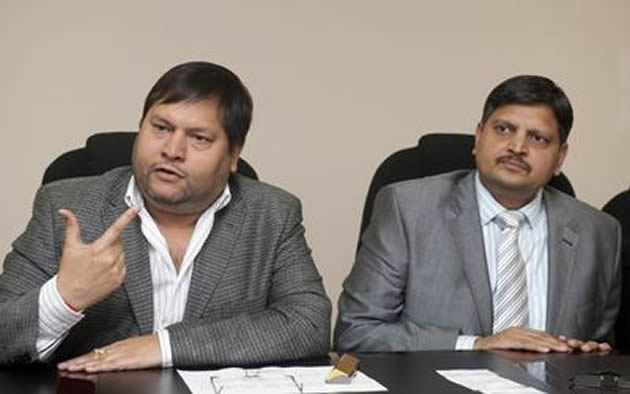‘How I reunited President with his comrades’


Cde Thomas Paul Ziki (second from left) sheds tears of joy as he meets his fellow ex-detainee, President Mugabe, during the 21st February Movement celebrations as First Lady Amai Grace Mugabe and other delegates look on
Tears of joy were shed last week at the 21st February Movement celebrations in Masvingo to commemorate the President’s birthday as President Mugabe was reunited with some of his fellow surviving inmates from Sikombela Restriction Camp, a colonial facility during Rhodesian rule. The one man who made this possible is Cde Raymond Mazorodze, a volunteer social worker who works closely with zanu-pf and is involved in researching and documenting the ruling party’s history. Our Senior Reporter Lovemore Ranga Mataire (LRM) caught up with Cde Mazorodze (RM) who spoke about how he brought President Mugabe together with his wartime buddies after half a century of separation.
LRM: Cde Mazorodze, can you explain your motivation in facilitating the meeting of President Mugabe and his fellow detainees 35 years after independence?
RM: First, you must understand that I am a voluntary social worker who after retiring from my job made a decision to work for the cause of the people without expecting any payment. I am an individual who values our history and I have so much respect for people like President Mugabe who sacrificed everything for the good of the majority.
The process to locate former restrictees and detainees who were with President Mugabe started way back in 2004 when I met the late Cde Edgar Tekere and arranged to go to Sikombela so that he could narrate his ordeal there. He agreed to go with me and in the process of narrating his story he mentioned an incident that took place there.
Cde Tekere said at some stage he had a heated argument with the late Cde Enos Nkala who punched him on the right cheek. He was restrained from retaliating by President Mugabe who told them to behave like adults. It was during the same month of October that I went to see Cde Nkala to verify Cde Tekere’s story and he confirmed the incident.
So that’s what essentially triggered my interest about the life behind the restriction camps. Besides, some of the comrades had approached me wanting to meet the President. I also wanted the President to reminisce on the journey he has travelled thus far. Yes, you may say that the event in Masvingo was the pinnacle of my voluntary work.
LRM: So how long did it take you to locate the surviving detainees?
RM: It took quite a long time. At one point I was so disheartened and heartbroken because some of the comrades had died. But I never gave up. The culmination of my perseverance was a letter I wrote to the Zanu-PF Secretary for Youth, Cde (Pupurai) Togarepi requesting that President Mugabe meets his former inmates and friends.
I indicated to Cde Togarepi that the comrades were former Sikombela and Gonakudzingwa restrictees with six of them having been at Sikombela while 10 were from Gonakudzingwa. I also indicated that it was important for His Excellency to meet some of them after nearly 50 years of separation.
Former Sikombela restrictees that I managed to contact are Cdes Solomon Marembo, Thomas Ziki, Kenneth Manyonda, Samson Maposa, Solomon Gwitira (Nyanyadzi) and Thuli Sithole (Gokwe).
Those who were at Gonakudzingwa with the late Father Zimbabwe are Cdes Mupasi Marinda (Chief Chiwara), Kakora Mhindurwa, Joseph Kapeta, Denga Hunda, Killion Bhebhe, Reniah Sungayi, Samuel Mpofu, Million Ngwenya, Zipa Ncube Inyathi and George Kawenda.
I must also mention that Cde Cephas Msipa was also very helpful in assisting me to locate former Gonakudzingwa restrictees and the late Dr Eddison Zvobgo also told me all the names of those at Sikombela. People like George Mudukuti and Solomon Evaristo Marembo.
LRM: Do you think this event (introducing the restrictees to President Mugabe) has propelled you to national recognition and appreciation of your voluntary work?
RM: It is not so much about national recognition but in a small measure I was happy to see the President smiling when he saw his former comrades after such a long time. That in itself brings joy to me. I am also happy with the fact that the First Family promised to meet them again.
I would also want the President to meet Cde Jane Lungile Ngwenya, the unheralded founding mother of Zimbabwe currently staying at No. W11 Coronation Old People’s Home in Bulawayo. She was incarcerated at Grey Prison, Gweru Central Female Prison, WhaWha, Gonakudzingwa and attended the All-Africa Cairo Conference in 1961 that later gave birth to the Organisation of African Unity.
She also visited Jomo Kenyatta, the founding president of Kenya when he was in detention. She used to broadcast from Lusaka, Zambia, encouraging young people to join the struggle. She also gave a testimony to the envoy of United Nations about the conditions of female freedom fighters in Southern Africa. She was the only woman in the National Democratic Party (NDP) executive that included Cde Mugabe, Michael Mawema and others.
LRM: Lastly, Cde Mazorodze, can you give us a brief background of yourself?
RM: I am neither a war veteran, a restrictee nor detainee. I played my role in supporting nationalists during the struggle through contributions that we used to make as a group. I was born at Machaya Village in Ndanga, Zaka District in Masvingo Province on February 1, 1947, in a humble family of four – three boys and one girl. I guess I am following the footsteps of my father who also had a passion for voluntary work and initiated the construction of Mutamba Primary School in 1942, established a grinding mill and various small dams for livestock.
I worked for various companies during Rhodesia but in 1979 I decided to work as voluntary social worker at the national level. In 1980, I was fortunate enough to receive legal advice from Dr Zvobgo who told me that I must never ask or accept money from those I help and that I should not be promiscuous. I still keep his advice religiously.
I have done quite a lot in my work. In 1980, I managed to facilitate the rehabilitation of two families from Zambia to Zimbabwe. The first family of Mr and Mrs Manunure had gone to Zambia in 1959 while the second family of Mr and Mrs Mudambiranwa had been in Zambia since 1962.
When refugees were repatriated from Zambia to Zimbabwe I went to Zambia and approached the United Nations Representative through the Lutheran Christian Church and everything went on smoothly and the two families came home.
On March 4, 1984 I had a successful meeting with Dr Zvobgo who later requested the Government to send a team of road construction workers who managed to tar the road from Roy to Zaka which was impassable during the rainy season. I also facilitated the establishment of two more public schools and shelters at Mbare Old Terminus and in 1987 I lobbied for the introduction of Shangani language on the then Radio 4 after meeting Members of Parliament for Chiredzi North and South, Cdes Henry Pote and Titus Maluleke.
I have initiated many projects – far too many to mention – and I have several pending ones which include the need for the construction of a post office in Budiriro, erecting statues of the late Vice Presidents Simon Muzenda and Joseph Msika, adequate shelters at the new Mbare Musika and at all other main bus terminuses in the country, spirt medium to give opening remarks at any national event before a pastor or reverend, change of chiefs gowns and army barracks to be given indigenous names.
I will continue with my voluntary work and my wish is for Zimbabweans to be selfless in pursuing various national causes without expecting any monetary personal benefits. – Southern Times.










Comments